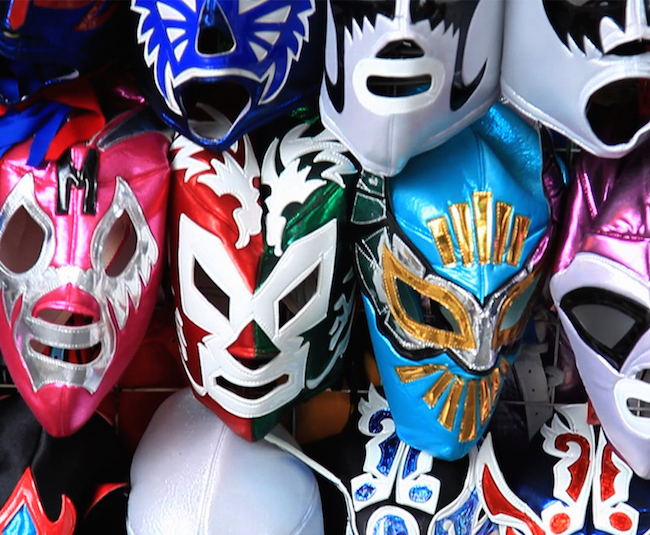Lead image via the film "Lucha Mexico"
Today is Cinco de Mayo, the festive holiday that is actually a bigger deal here in the US than in Mexico, probably because it’s the perfect excuse to drink margaritas. But Cinco de Mayo is also a good reason to dedicate our latest Netflix column to some fine Mexican films you may not be aware of.
For those who don’t know, Mexican cinema has a proud history, most notably “The Golden Age” period that lasted from the 1930s to the 1950s. Of course, in more recent times, the country is responsible for acclaimed directors such as Alejandro González Iñárritu (The Revenant), Guillermo del Toro (Hellboy) and Alfonso Cuarón (Gravity), all of whom have worked in Hollywood and earned international success. When these famous filmmakers release movies, the world pays attention. But there are plenty of lesser known Mexican films available on Netflix right now that are worth a look, like the creepy horror thriller Scherzo Diabolico, for example. There’s so many, in fact, we didn’t have room to include the biting political satire The Perfect Dictatorship, the claustrophobic earthquake drama 7:19, or the quirky romantic comedy Tiempos Felices (Happy Times).
But here are the films we recommend you check out first at some point during your Cinco de Mayo weekend:
The mind-bending Casa de mi Padre starring a Spanish-speaking Will Ferrell is unlike any of the his previous comedies, one that starts making more sense after a few shots of tequila.
Lucha Mexico documents the lives of several pro wrestlers, giving us an intimate view of the ups and downs of these dedicated athletes who participate in a sport that holds a special place in the hearts of many Mexican people.
If you think Mexicans only listen to mariachi music, the shocking biopic Gloria introduces you to ‘90s pop star Gloria Trevi, whose successful career was wrecked by a sex scandal. Staying on the music tip, Los Punks: We Are All We Have proves that punk rock hasn’t died and continues to be a vital art form for young Chicanos and Chicanas living in communities like East L.A.
And to wrap things up, we revisit Alfonso Cuarón’s Y Tu Mamá También, a great film that not only helped make Gael García Bernal and Diego Luna famous, but provides meaningful insight into friendship, sex, and life’s unexpected twists and turns.
Warning: May Contain Spoilers
Casa de mi Padre (2012)
Starring: Will Ferrell, Gael García Bernal, Diego Luna, Genesis Rodriguez
Director: Matt Piedmont
Genre: Comedy
It’s likely that Casa de mi Padre threw some people off when it was released in theaters. Non-hispanic audiences probably weren’t ready to see American comedian Will Ferrell speaking Spanish for the entire length of a movie that parodied traditional Mexican cinema and melodramatic telenovelas. But credit Ferrell for daring to commit 100% to this silly story about a goody two-shoes rancher and his dope dealer brother.
Make no mistake, this is a weird, almost surreal movie that stretches jokes out to uncomfortable lengths and uses furry animal puppets for absurd sight gags. It makes fun of machismo and soap opera-style love stories but manages to laugh along with — and not at — Mexican culture and entertainment, an important distinction. (The filmmakers showed enough class to cast Pedro Armendáriz Jr., a respected Mexican actor in one of his last roles.)
Casa de mi Padre is definitely more enjoyable if you know going in that it’s going to be a bizarre ride. Watching it with Mari Juana won’t hurt either.
Lucha Mexico (2016)
Starring: Shocker, El Hijo Del Perro Aguayo, Jon Strongman, Blue Demon, Jr, KeMonito
Directors: Alex Hammond, Ian Markiewicz
Genre: Documentary, Sports
Lucha Libre, the popular style of Mexican wrestling that dates back to the early 1930s, is known for its acrobatic stunts and use of colorful masks fit for superheroes. Lucha Mexico follows several of these professional wrestlers both in and out of the ring. We hear from chiseled veterans, tough and athletic females, little people in costumes, and sons of famous wrestlers who carry on the legacy.
Of course, these gifted athletes do it to support their families, which can be difficult in bad economic times. But one gets a sense that they do it, too, because wrestling is interwoven into Mexico’s culture. As one retired veteran says in the film, the only payment wrestlers get is injuries and the love of the people, and we get plenty of evidence that this is a dangerous job. We also see how some wrestlers go from appearing on television one night to doing a no-frills show in a parking lot in front of a small crowd the next day. It’s a dedication to one’s craft that’s mighty impressive.
By the way, you may also want to check out director Carlos Ávila’s Tales of Masked Men (2012), an informative history lesson on Mexican wrestling that’s mostly in English.
Gloria (2015)
Starring: Sofía Espinosa, Marco Pérez
Director: Christian Keller
Genre: Biography, Drama, Music
A film like Gloria, based on the scandalous career of Mexican pop star Gloria Trevi, could have easily turned campy or obscene when you consider the story involves headline-grabbing allegations of underage girls being brainwashed into a sex cult. But this polished biopic tells its tale mostly in a reserved tone, jumping back and forth in time and showing us how an impressionable young singer full of raw talent transformed into an early ‘90s sensation before becoming a fugitive from the law.
Sofía Espinosa, who portrays the rebellious Trevi and who does her own singing, is near perfect, embodying the energetic spirit and outspokenness the real Gloria was known for. Marco Pérez as the lecherous and manipulative mentor/manager Sergio Andrade is mesmerizing as his outlandish behavior gets more out of control. Their strong performances go a long way to somewhat balance out the film’s only flaw, which is to let Trevi off the hook too easily for the serious crimes she was alleged to have been a part of for years.
Los Punks: We Are All We Have (2016)
Starring: Nacho Corrupted, April Desmadre, Alex Pedorro, Gary Alvarez
Director: Angela Boatwright
Genre: Documentary, Music
Punk rock has the reputation of being a genre that only white kids like, but that’s far from the truth. Non-white fans may be a minority, but they have been down with the music since its inception in the 1970s. Go back to that era, especially on the West Coast, and you’ll find Latinx punk rockers who didn’t always get the same attention or acceptance as other bands.
As we learn in Los Punks, the modern punk scene is alive and well in places like East L.A., Boyle Heights, and surrounding areas where predominantly Latinx bands play backyard parties. As you’d expect, a good portion of the scene is made up of Mexican-American kids, a few of which are interviewed in this entertaining documentary that nicely demonstrates the benefits that punk’s DIY ethos can have for young people (some of the kids proudly reveal their plans of one day becoming lawyers, chefs, or health care workers). Not only that, the film also makes it clear how important it is for kids to have an outlet for their aggression and why jumping in mosh pits is a better alternative than gang banging.
Y Tu Mamá También (2001)
Starring: Maribel Verdú, Gael García Bernal, Diego Luna
Director: Alfonso Cuarón
Genre: Drama, Comedy
One can always point to the acting, direction, or any other technical aspect of a film to explain why they like it. But sometimes films like the award-winning Y Tu Mamá También have that special something that goes beyond simple explanation.
The movie, which is about two spoiled (and vulgar) boys (a really young-looking Diego Luna and Gael García Bernal) who go on a road trip with a beautiful older woman (Maribel Verdú), moves along with the carefree attitude that comes with being young and free. It’s driven by a frank sexual openness not often seen in American cinema, yet there’s always a deeper meaning just below the surface. They’re just fleeting moments, dry observations made by an unseen narrator, but we begin to comprehend the class division in Mexico, the way politics work against the poor. We see privilege at play, how money and ignorance shields Luna and Bernal’s characters from the true ways of the world and allows them to think only about themselves. Verdú’s exceptionally brave Luisa is a fantasy come true for Tenoch and Julio, yes, but she’s also a hard dose of reality, a true friend not afraid to tell them when they’re being assholes and even willing to teach them how to become real men, despite her own problems. Cinco de Mayo or not, we can all use amigos like that.











